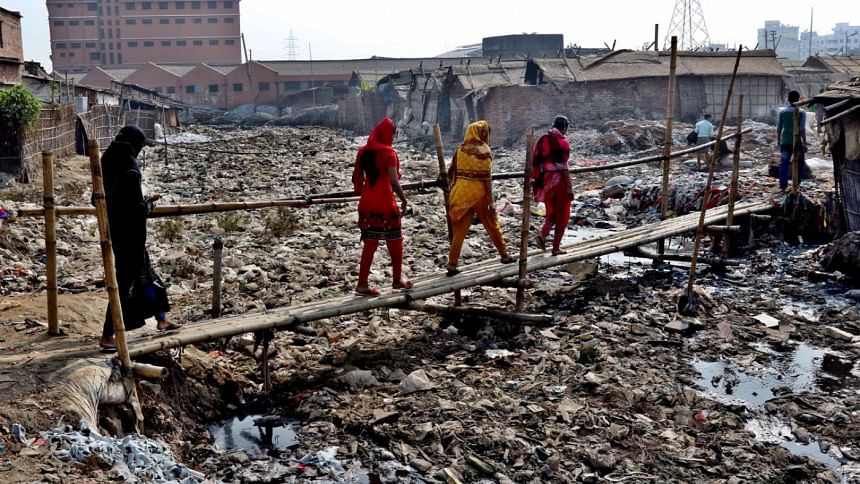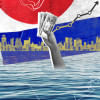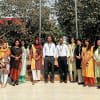The environment we live in

Two reports appeared on the same day. Sal forests in Gazipur are heavily degraded. They have reduced by 79 percent within a decade. Encroachment by land grabbers, unrestricted cutting of forests, illegal establishment of factories, and unplanned development projects, houses, and social afforestation have been identified as the reasons. Also illegal capture of forest animals and collection of forest resources transformed a national park such as Gazipur into its current deplorable state. Lack of awareness among common people may also have contributed to this degradation. The continuous process of degradation of this forest land and other forest areas in the country have brought us to a situation where we are struggling to maintain the standard level of forest cover needed for a country.
The other news is about the shifting of the tannery industry to its new designated area. Relocation of tanneries to Hemayetpur of Savar has been pending for 13 years since the government order was issued. Meanwhile, pollution of the Buriganga River from tannery wastes continues to increase the misery of the residents of the area. The unbearable stench, the layers of garbage and the thickness of chemical mixed water can give one a picture of how 'liveable' the area is. But the impoverished community in the area has no other option but to use the water for shower, washing clothes, cleaning utensils and for other necessities. Experts suggest that unless Buriganga is cleaned, not only will the health and livelihood conditions of the local people worsen, but other areas of Dhaka city will also be seriously affected.
These two are among many examples of how the environment is degraded and natural resources are depleted in the country. Water and air pollution, decline in soil fertility, and loss of natural forests, wetland and coastal environment are the result of activities such as land clearing, excessive use of chemical fertilisers, excessive exploitation of natural resources for commercial purpose, deforestation, overfishing and overgrazing. Air pollution from vehicles and industries in Dhaka and Chittagong cities have crossed the threshold level of particulate matter set by the country's Department of Environment. Water from rivers around Dhaka is unsuitable not only for human consumption, but also for other living creatures. Human intervention on the environment has also led to the loss of biological diversity and ecological balance and to the extinction of several species of the plant and animal world.
Bangladesh depends heavily on its natural resources for employment, revenues and foreign exchange. The majority of its population rely on the primary sector for their main economic activities. This puts a pressure on our limited resources, degrading the environment. When opportunities become limited, the poor migrate to cities for better prospects. Population pressure on urban areas causes land scarcity, increased pollution and social problems in those areas. Many of these people have to live in slums without proper facilities such as water, sewage, drainage and garbage removal. This deteriorates the environment and their own health.
However, Bangladesh's case cannot be compared to the traditional models of 'vicious circles' in which population change and poverty seem to exacerbate policy failures and degrade the environment. Thus, the causes of environmental degradation in Bangladesh cannot be linked to only population pressure and poverty. There are many cases when rapid population growth prompted technical change that improved the environment.
When it comes to exploitation of natural resources, it is not poverty, but prosperity that takes the lead. The greed for more accumulation prompts grabbing of land, forests, lakes and ponds. The poor use natural resources to meet their basic necessities; the corrupt wealthy group acquires such resources for further enhancement of their wealth. The poor exploit natural resources to survive. The rich exploit natural resources to upgrade their status. And the difference between the extent of exploitation by the rich and the poor is beyond comparison.
On the contrary, environmental damage and depletion of natural resources affect the poorest in the community in the worst way. Thus the poor will tend to rely on untreated water sources, whereas the rich may have access to water treated in a treatment plant. The poor will rely on fuelwood and suffer from pollution; the rich will depend on liquid fuels and natural gas.
So while the solution to many environmental problems lies in the reduction of poverty, it is more important to establish property rights and reduce inequality. In an unequal social structure, influential groups with vested interests manipulate policies for their own benefit. The poor, who are the direct and worst victim of degradation, remain outside the decision making process.
Hence, without proactive measures by policymakers, the trend of environmental degradation will not change. In the absence of clearly defined property rights, opportunities for resource grabbing arise. Over the years, policymakers have taken various measures, including formulating strategies and allocating resources, but the outcome has not been very promising. For example, measures to control air pollution by banning the use of two-stroke engine vehicles, and promoting increased use of compressed natural gas in vehicles and the supply of unleaded petrol are praiseworthy. However, the country is yet to observe any significant improvement. Similarly, without strong measures by the policymakers, the deforestation process will continue. The forest department has neither the efficiency nor the power to oppose encroachment by the powerful.
Environment and natural resources, if not managed properly, will lead to non-sustainability. Depletion of resources constitutes a reduction in the capital base of the economy. If this reduction is not offset by adequate investments in the environment, then the economy is at risk of being unsustainable. Bangladesh's economic and social transformation is spectacular on many accounts. However, similar strides are yet to be observed in case of environmental transformation.
The writer is Research Director at the Centre for Policy Dialogue.

 For all latest news, follow The Daily Star's Google News channel.
For all latest news, follow The Daily Star's Google News channel. 








Comments